- Home
- Patrick O'Brian
H.M.S. Surprise Page 2
H.M.S. Surprise Read online
Page 2
'It is for me, my dear. Jack said I was to be firm—Jack loves firmness of character. He said that Lord Nelson . . .'
Far, far over the still and almost freezing air came the sound of a horn on Polcary Down. They both turned to the window. 'Did they kill their fox, I wonder, now?' said Stephen. 'If Jack were home, he would know, the animal.'
'Oh, I am so glad he is not out there on that wicked great bay,' said Sophia. 'It always managed to get him off, and I was always afraid he would break his leg, like young Mr Savile. Stephen, will you help me draw the curtain?'
'How she has grown up,' said Stephen privately. And aloud, as he looked out of the window, holding the cord in one hand, 'What is the name of that tree? The slim exotic, standing on the lawn?'
'We call it the pagoda-tree. It is not a real pagoda-tree, but that is what we call it. My uncle Palmer, the traveller, planted it; and he said it was very like.'
As soon as she had spoken Sophia regretted it—she regretted it even before the sentence was out, for she knew where the word might lead Stephen's mind.
These uneasy intuitions are so often right: to anyone who had the least connection with India the pagoda-tree must necessarily be associated with those parts. Pagodas were small gold coins resembling its leaves, and shaking the pagoda-tree meant making an Indian fortune, becoming a nabob—a usual expression. Both Sophia and Stephen were concerned with India, because Diana Villiers was said to be there, with her lover and indeed keeper Richard Canning. Diana was Sophia's cousin, once her rival for the affections of Jack Aubrey, and at the same time the object of Stephen's eager, desperate pursuit—a dashing young woman of surprising charms and undaunted firmness of character, who had been very much part of their lives until her elopement with Mr Canning. She was the black sheep of the family, of course, the scabbed ewe, and in principle her name was never mentioned at Mapes; yet it was surprising how much they knew about her movements and how great a place she occupied in their thoughts.
The newspapers had told them a great deal, for Mr Canning was something of a public figure, a wealthy man with interests in shipping and in the East India Company, in politics (he and his relations owned three rotten boroughs, appointing members to sit for them, since they could not sit themselves, being Jews), and in the social world, Mr Canning having friends among the Prince of Wales's set. And rumour, making its way from the next county, where his cousins the Goldsmids lived, had told them more. But even so, they had nothing like the information that Stephen Maturin possessed, for in spite of his unworldly appearance and his unfeigned devotion to natural philosophy, he had wide-reaching contacts and great skill in using them. He knew the name of the East Indiaman in which Mrs Villiers had sailed, the position of her cabin, the names of her two maids, their relations and background (one was French, with a soldier brother taken early in the war and now imprisoned at Norman Cross). He knew the number of bills she had left unpaid, and their amount; he knew a great deal about the storm that had raged so violently in the Canning, Goldsmid and Mocatta families, and that was still raging, for Mrs Canning (a Goldsmid by birth) had no notion of a plurality of wives, and she called upon all her relations to defend her with a furious, untiring zeal—a storm that had induced Canning to leave for India, with an official mission connected with the French establishments on the Malabar coast, a rare place for gathering pagodas.
Sophia was right: these were indeed the thoughts that flooded into Stephen's mind at the name of that unlucky tree—these and a great many more, as he sat silently by the glow of the fire. Not that they had far to travel; they hovered most of the time at no great distance, ready to appear in the morning when he woke, wondering why he was so oppressed with grief; and when they were not immediately present their place was marked by a physical pain in his midriff, in an area that he could cover with the palm of his hand.
In a secret drawer of his desk, making it difficult to open or close, lay docketed reports headed Villiers, Diana, widow of Charles Villiers, late of Bombay, Esquire, and Canning, Richard, of Park Street and Coluber House, co. Bristol. These two were as carefully documented as any pair of State suspects working for Bonaparte's intelligence services; and although much of this mass of paper had come from benevolent sources, a good deal of it had been acquired in the ordinary way of business, and it had cost a mint of money. Stephen had spared no expense in making himself more unhappy, his own position as a rejected lover even clearer.
'Why do I gather all these wounds?' he wondered. 'With what motive? To be sure, in war any accession of intelligence is an advance: and I may call this a private war. Is it to persuade myself that I am fighting still, although I have been beaten out of the field? Rational enough, but no doubt false—too glib it is.' He uttered these remarks in Catalan, for being something of a polyglot he had a way of suiting his train of thought to the language that matched it best—his mother was a Catalan, his father an Irish officer, and Catalan, English, French, Castilian came to him as naturally as breathing, without preference, except for subject.
'How I wish I had held my tongue,' thought Sophie. She looked anxiously at Stephen as he sat there, bent and staring into the red cavern under the log. 'Poor dear thing,' she thought, 'how very much he is in need of darning—how very much he needs someone to look after him. He really is not fit to wander about the world alone; it is so hard to unworldly people. How could she have been so cruel? It was like hitting a child. A child. How little learning does for a man—he knows almost nothing: he had but to say "Pray be so good as to marry me" last summer and she would have cried "Oh yes, if you please". I told him so. Not that she would ever have made him happy, the . . .' Bitch was the word that struggled to make itself heard; but it struggled in vain. 'I shall never love that pagoda-tree again. We were so pleasant together, and now it is as though the fire had gone out . . . it will go out, too, unless I put another log on. And it is quite dark.' Her hand went out towards the bell-pull to ring for candles, wavered, and returned to her lap. 'It is terrible how people suffer,' she thought. 'How lucky I am: sometimes it terrifies me. Dearest Jack . . .' her inner eye filled with a brilliant image of Jack Aubrey, tall, straight, cheerful, overflowing with life and direct open affection, his yellow hair falling over his post-captain's epaulette and his high-coloured weather-beaten face stretched in an intensely amused laugh: she could see the wicked scar that ran from the angle of his jaw right up into his scalp, every detail of his uniform, his Nile medal, and the heavy, curved sword the Patriotic Fund had given him for sinking the Bellone. His bright blue eyes almost vanished when he laughed—all you saw were shining slits, even bluer in the scarlet flush of mirth. Never was there anyone with whom she had had such fun—no one had ever laughed like that.
The vision was shattered by the opening of the door and a flood of light from the haIl: the squat thick form of Mrs Williams stood there, black in the doorway, and her loud voice cried, 'What, what is this? Sitting alone in the dark?' Her eyes darted from the one to the other to confirm the suspicions that had been growing in her mind ever since the silence had fallen between them—a silence of which she was perfectly aware, as she had been sitting in the library close to a cupboard in the panelling: when this cupboard door was open, one could not help hearing what was said in the small drawing-room. But their immobility, their civil, surprised faces turned towards her, convinced Mrs Williams of her mistake and she said with a laugh, 'A lady and gentleman sitting alone in the dark—it would never have done in my time, la! The gentlemen of the family would have called upon Dr Maturin for an explanation. Where is Cecilia? She ought to have been keeping you company. In the dark . . . but I dare say you were thinking of the candles, Sophie. Good girl. You would not credit, Doctor,' she said, turning towards her guest with a polite look; for although Dr Maturin was scarcely to be compared with his friend Captain Aubrey, he was known to be the possessor of a marble bath and of a castle in Spain—a castle in Spain!—and he might very well do for her younger daughter: had Cecilia been sitting in the da
rk with Dr Maturin she would never have burst in. 'You would not credit how candles have risen. No doubt Cecilia would have had the same idea. All my daughters have been brought up with a strict sense of economy, Dr Maturin; there is no waste in this house. However, if it had been Cecilia in the dark with a beau, that would never have done; the game would not have been worth the candle, ahem! No sir, you would never believe how wax has gone up since the beginning of the war. Sometimes I am tempted to turn to tallow; but poor though we are, I cannot bring myself to it—at least not in the public rooms. However, I have two candles burning in the library, and you shall have one: John need not light the sconces in here. I was obliged to have two, Dr Maturin, for I have been sitting with my man of business all this time—nearly all this time. The writings and the contracts and the settlements are so very long and complicated, and I am an infant in these matters.' The infant's estate ran far beyond the parish boundaries, and tenants' babies as far away as Starveacre, on being told 'Mrs Williams will come for you', would fall mute with horror. 'But Mr Wilbraham throws out some pretty severe reflections on us all for our dilatoriness, as he calls it, though I am sure it is not our fault, with Captain A so far away.'
She bustled away for the candle, pursing her mouth. These negotiations were drawing out in length, not from any petulance on the part of Mr Wilbraham, but because of Mrs Williams's iron determination not to part with her daughter's virginity or her ten thousand pounds until an 'adequate provision', a binding marriage-settlement, had been signed, sealed, anti above all, the hard cash delivered, it was this that was hanging fire so strangely: Jack had agreed to all the conditions, however rapacious; he had tied up his property, pay, prospects and future prize-money for the benefit of his widow and any offspring of this union for ever, in the most liberal way, as though he had been a pauper; but still the actual money did not appear, and not a step would Mrs Williams move until it was in her hands, not in promises, but in minted gold or its copper-bottomed, Bank of England guaranteed equivalent.
'There,' she said, coming back and looking sharply at the log which Sophia had put on the fire. 'One will be enough, will it not, unless you wish to read? But I dare say you still have plenty to talk about.'
'Yes,' said Sophia, when they were alone again. 'There is something I should like to ask you. I have been meaning to draw you aside ever since you came . . . It is dreadful to be so ignorant, and I would not have Captain Aubrey know it for the world; and I cannot ask my mother. But with you it is quite different.'
'One may say anything at all to a medical man,' said Stephen, and a look of professional, anonymous gravity came over his face, partly overlaying its look of strong personal affection.
'A medical man?' cried Sophia. 'Oh, yes. Of course: certainly. But what I really meant, dear Stephen, was this war. It has been going on for ever now, apart from that short break. Going on for ever—and oh how I wish it would stop—for years and years, as long as I can remember; but I am afraid I have not always paid as much attention as I should. Of course, I do know it is the French who are so wicked; but there are all these people who keep coming and going—the Austrians, the Spaniards, the Russians. Pray, are the Russians a good thing now? it would be very shocking—treason no doubt—to put the wrong people in my prayers. And there are all those Italians, and the poor dear Pope: and only the very day before he left, Jack mentioned Pappenburg—he had hoisted the flag of Pappenburg, by way of a ruse de guerre; so Pappenburg must be a country. I was despicably false, and only nodded, looking as wise as I could, and said, "Ah, Pappenburg." I am so afraid he will think me ignorant: which of course I am, but I cannot bear him to know it. I am sure there are quantities of young women who know where Pappenburg is, and Batavia, and this Ligurian Republic; but we never did such places with Miss Blake. And this Kingdom of the Two Sicilies: I can find one on the map, but not the other. Stephen, pray tell me the present state of the world.'
'Is it the state of the world, my dear?' said Stephen, with a grin—no professional look left at all. 'Well now, for the moment, it is plain enough. On our side we have Austria, Russia, Sweden and Naples, which is the same as your Two Sicilies; and on his he has a whole cloud of little states, and Bavaria and Holland and Spain. Not that these alliances are of much consequence one side or the other: The Russians were with us, and then against us until they strangled their Czar, and now with us; and I dare say they will change again, when the whim bites. The Austrians left the war in '97 and then again in the year one, after Hohenlinden: the same thing may happen again any day. What matters to us is Holland and Spain, for they have navies; and if ever this war is to be won, it must be won at sea. Bonaparte has about forty-five ships of the line, and we have eighty-odd, which sounds well enough. But ours are scattered all over the world and his are not. Then again the Spaniards have twenty-seven, to say nothing of the Dutch; so it is essential to prevent them from combining, for if Bonaparte can assemble a superior force in the Channel, even for a little while, then his invasion army can come across, God forbid. That is why Jack and Lord Nelson are beating up and down off Toulon, bottling up Monsieur de Villeneuve with his eleven ships of the line and seven frigates, preventing them from combining with the Spaniards in Cartagena and Cadiz and Ferrol; and that is where I am going to join him as soon as I have been to London to settle one or two little points of business and to buy a large quantity of madder. So if you have any messages, now is the time; for, Sophie, I am upon the wing.' He stood up, scattering crumbs, and the clock on the black cabinet struck the hour.
'Oh, Stephen, must you go?' cried Sophie. 'Let me brush you a little. Will you not stay supper? Pray, do stay supper—I will make you toasted cheese.'
'I will not, my dear, though you are very kind,' said Stephen, standing like a horse as she brushed at him, turned down his collar and twitched at his cravat—since his disappointment he had grown less nice about his linen; he had given up the practice of brushing his clothes or his boots, and neither his face nor his hands were particularly clean. 'There is a meeting of the Entomological Society that I might just be able to attend, if I hurry. There, there, my dear, that will do: Mary and Joseph, I am not going to Court—the entomologists do not set up for beaux. Now give me a kiss, like a good creature, and tell me what I am to say—what messages I am to give to Jack.'
'How I wish, oh how I wish I were going with you . . . It would be of no use begging him to be prudent, not to take risks, I suppose?'
'I will mention it, if you choose. But believe me, honey, Jack is not an imprudent man—not at sea. He never takes a risk without he has weighed it very carefully: he loves his ship and his men too much, far too much, to run them into any unconsidered danger—he is not one of your wild, hit-or-miss, fire-eating rapparees.'
'He would not do anything rash?'
'Never in life. It's true, you know; quite true,' he added, seeing that Sophia was not wholly persuaded that Jack at sea and Jack ashore were two different persons.
'Well,' she said, and paused. 'How long it seems; everything seems to take so very long.'
'Nonsense,' said Stephen, with an assumed liveliness. 'Parliament rises in a few weeks' time; Captain Hamond will go back to his ship, and Jack will be thrown on the beach again. You will see as much of him as your heart could desire. Now what shall I say?'
'Give him my dearest love, Stephen, if you please; and pray, pray, take the greatest care of yourself, too.'
Dr Maturin walked into the Entomological Society's meeting as the Reverend Mr Lamb began his paper on Certain Non-Descript Beetles found on the Shore at Pringle-juxta-Mare in the Year 1799. He sat down at the back and listened closely for a while; but presently the gentleman strayed from his theme (as everyone had known he would) and began to harangue the gathering on the hibernation of swallows; for he had found a new prop for his theory—not only did they fly in ever-decreasing circles, conglobulate in a mass and plunge to the bottoms of quiet ponds, but they also took refuge in the shafts of tin-mines, 'of Cornish tin-mines, gen
tlemen!' Stephen's attention wandered, and he glanced over the restless entomologists; several he knew—the worthy Dr Musgrave, who had favoured him with a prime carena quindecimpunctata; Mr Tolston, of stag-beetle fame; Eusebius Piscator, that learned Swede—and surely the plump back and powdered queue looked familiar? It was odd how one's eye must take in and store innumerable measurements and proportions; a back was almost as recognizable as a face. This applied also to gait, stance, lift of head: what countless references at every turn! This back was turned from his with an odd, unnatural twist, and its owner's left hand was raised, resting on his jaw in such a way as to shield his face: no doubt it was this twist that had caught his eye; yet in all their dealings he had never seen Sir Joseph writhe himself into such an attitude.
'. . . and so, gentlemen, I believe I may confidently state that the hibernation of swallows, and of all the other hirundines, is conclusively proved,' said Mr Lamb, with a defiant glare at his audience.
'I am sure were are all very grateful to Mr Lamb,' said the chairman, in an atmosphere of general discontent, with some cross shuffling of feet and murmuring. 'And although I am afraid that we are now short of time—perhaps not all the papers can be read—allow me to call on Sir Joseph Blain to favour us with his remarks on A True Gynandromorph recently added to his Cabinet.'

 The Final Unfinished Voyage of Jack Aubrey
The Final Unfinished Voyage of Jack Aubrey The Rendezvous and Other Stories
The Rendezvous and Other Stories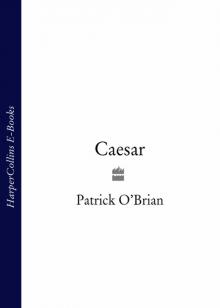 Caesar: The Life Story of a Panda-Leopard
Caesar: The Life Story of a Panda-Leopard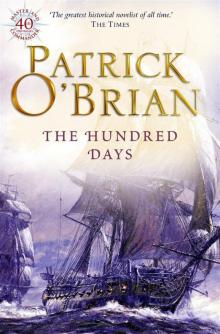 The Hundred Days
The Hundred Days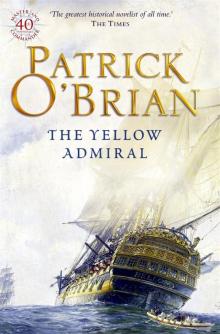 The Yellow Admiral
The Yellow Admiral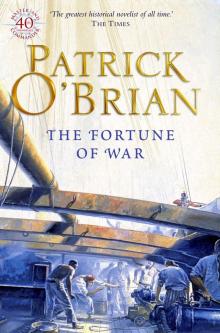 The Fortune of War
The Fortune of War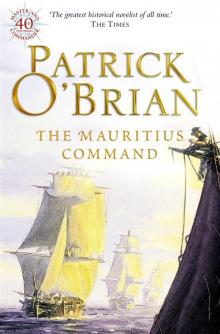 The Mauritius Command
The Mauritius Command Beasts Royal: Twelve Tales of Adventure
Beasts Royal: Twelve Tales of Adventure A Book of Voyages
A Book of Voyages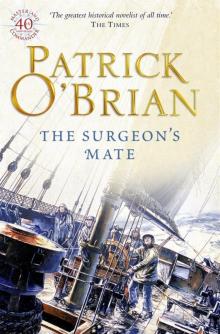 The Surgeon's Mate
The Surgeon's Mate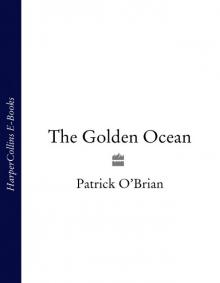 The Golden Ocean
The Golden Ocean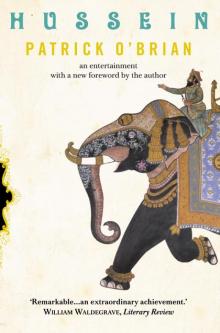 Hussein: An Entertainment
Hussein: An Entertainment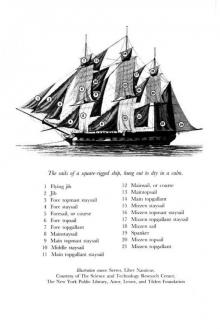 H.M.S. Surprise
H.M.S. Surprise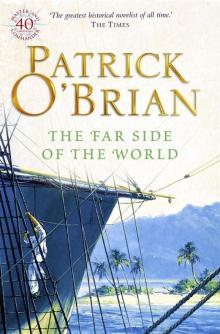 The Far Side of the World
The Far Side of the World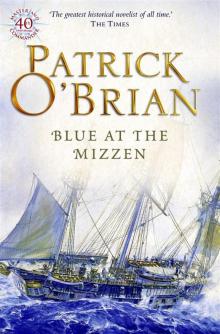 Blue at the Mizzen
Blue at the Mizzen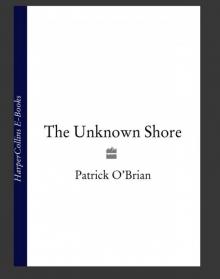 The Unknown Shore
The Unknown Shore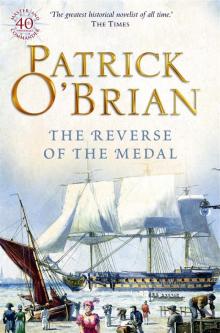 The Reverse of the Medal
The Reverse of the Medal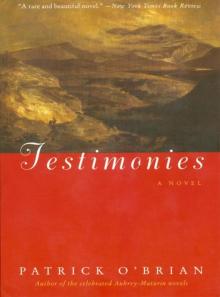 Testimonies
Testimonies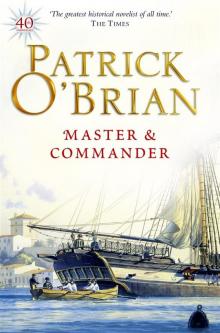 Master and Commander
Master and Commander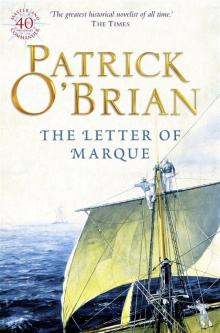 The Letter of Marque
The Letter of Marque Treason's Harbour
Treason's Harbour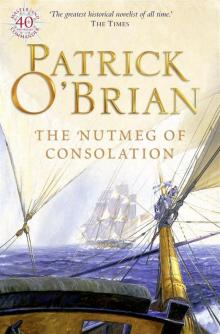 The Nutmeg of Consolation
The Nutmeg of Consolation 21: The Final Unfinished Voyage of Jack Aubrey
21: The Final Unfinished Voyage of Jack Aubrey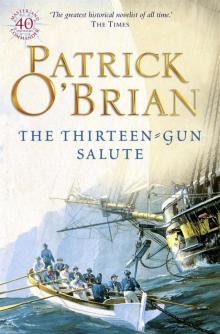 The Thirteen-Gun Salute
The Thirteen-Gun Salute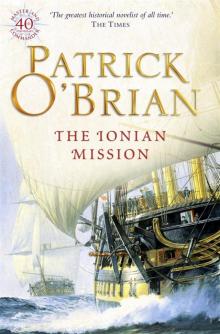 The Ionian Mission
The Ionian Mission Men-of-War
Men-of-War The Commodore
The Commodore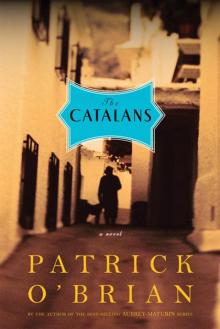 The Catalans
The Catalans Aub-Mat 08 - The Ionian Mission
Aub-Mat 08 - The Ionian Mission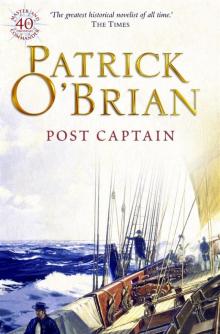 Post Captain
Post Captain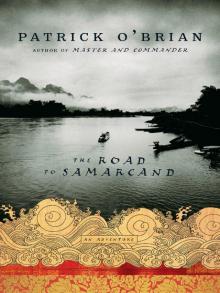 The Road to Samarcand
The Road to Samarcand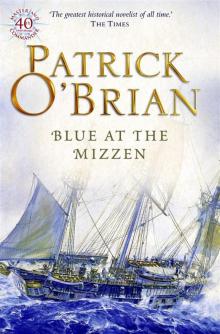 Book 20 - Blue At The Mizzen
Book 20 - Blue At The Mizzen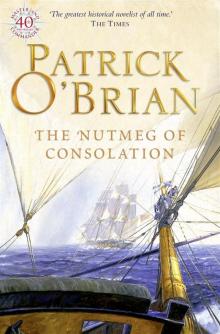 Book 14 - The Nutmeg Of Consolation
Book 14 - The Nutmeg Of Consolation Caesar
Caesar The Wine-Dark Sea
The Wine-Dark Sea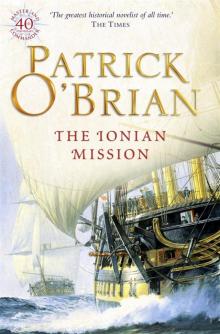 Book 8 - The Ionian Mission
Book 8 - The Ionian Mission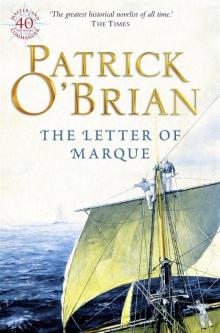 Book 12 - The Letter of Marque
Book 12 - The Letter of Marque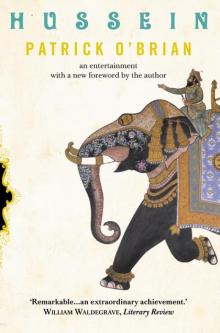 Hussein
Hussein Book 9 - Treason's Harbour
Book 9 - Treason's Harbour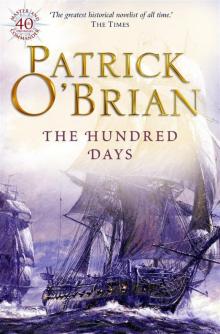 Book 19 - The Hundred Days
Book 19 - The Hundred Days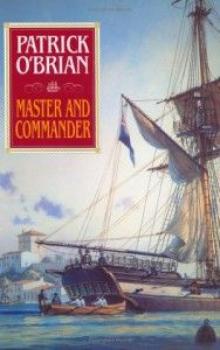 Master & Commander a-1
Master & Commander a-1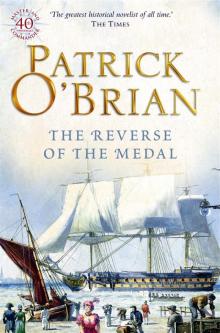 Book 11 - The Reverse Of The Medal
Book 11 - The Reverse Of The Medal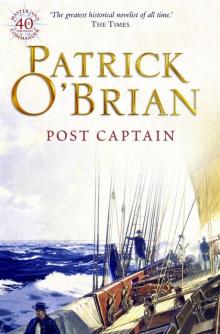 Book 2 - Post Captain
Book 2 - Post Captain The Truelove
The Truelove The Thirteen Gun Salute
The Thirteen Gun Salute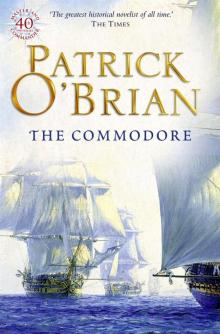 Book 17 - The Commodore
Book 17 - The Commodore The Final, Unfinished Voyage of Jack Aubrey
The Final, Unfinished Voyage of Jack Aubrey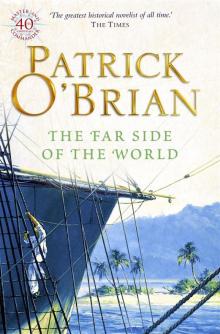 Book 10 - The Far Side Of The World
Book 10 - The Far Side Of The World Book 5 - Desolation Island
Book 5 - Desolation Island Beasts Royal
Beasts Royal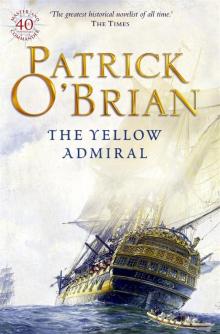 Book 18 - The Yellow Admiral
Book 18 - The Yellow Admiral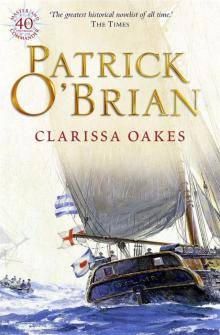 Book 15 - Clarissa Oakes
Book 15 - Clarissa Oakes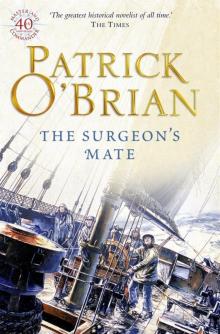 Book 7 - The Surgeon's Mate
Book 7 - The Surgeon's Mate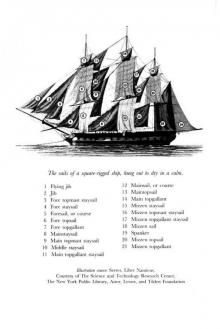 Book 3 - H.M.S. Surprise
Book 3 - H.M.S. Surprise Desolation island
Desolation island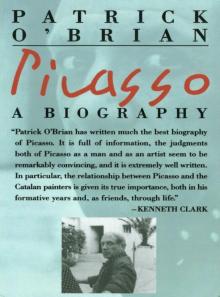 Picasso: A Biography
Picasso: A Biography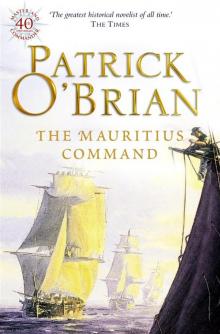 Book 4 - The Mauritius Command
Book 4 - The Mauritius Command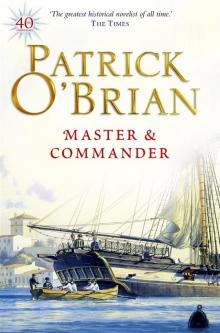 Book 1 - Master & Commander
Book 1 - Master & Commander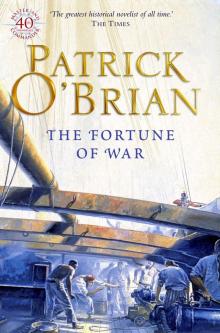 Book 6 - The Fortune Of War
Book 6 - The Fortune Of War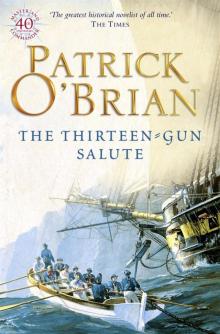 Book 13 - The Thirteen-Gun Salute
Book 13 - The Thirteen-Gun Salute Book 16 - The Wine-Dark Sea
Book 16 - The Wine-Dark Sea